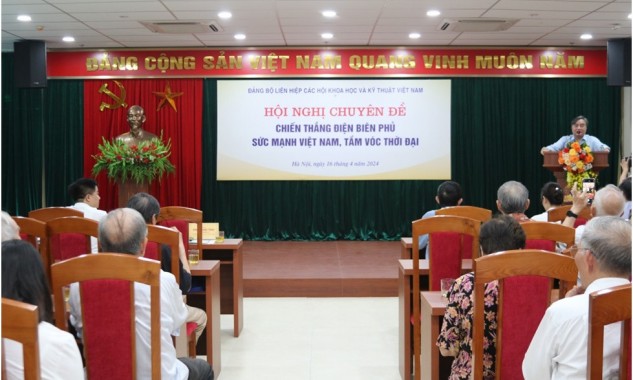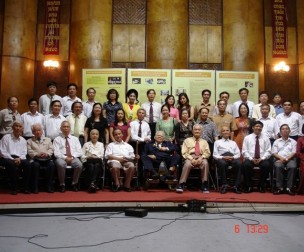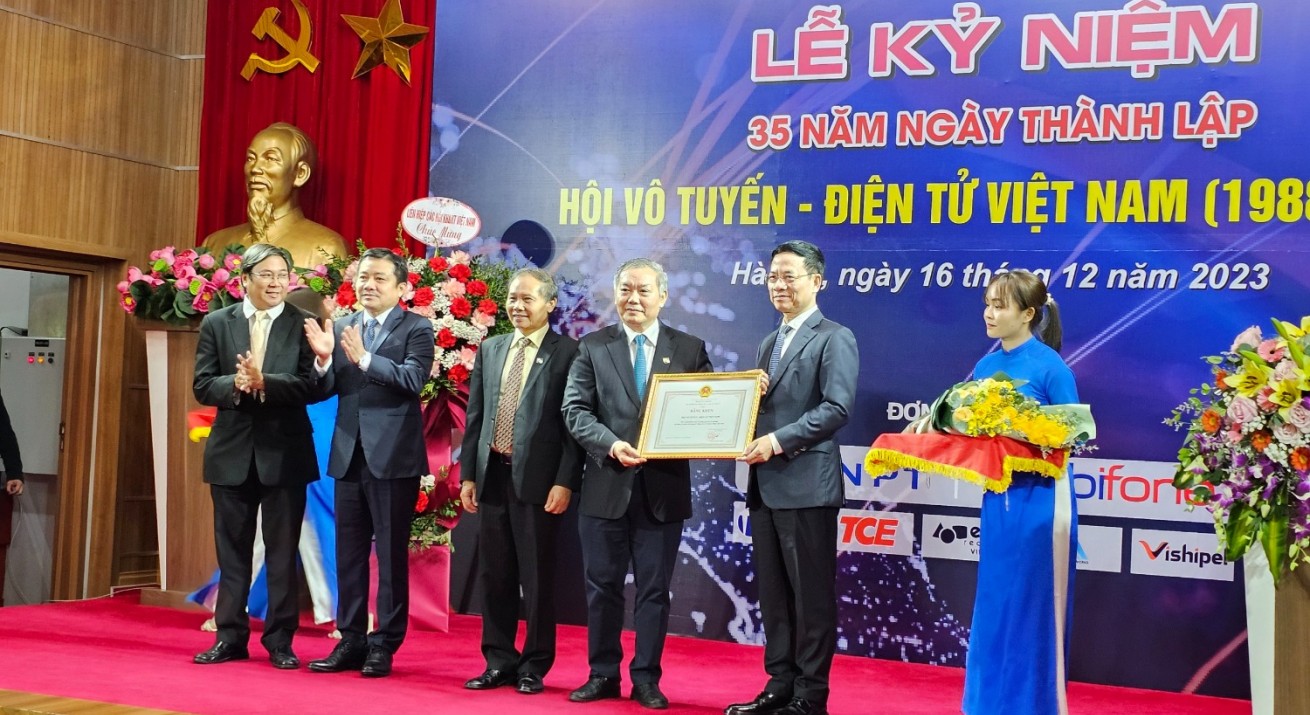
World Mobile Broadband ISP & Cloud Summit 2024: thị trường băng thông di động Việt Nam với chuyển đổi số
Chiều ngày 12/04, tại Hà Nội, Hội Vô tuyến - Điện tử Việt Nam (REV), Hội Truyền thông số Việt Nam (VDCA) và tập đoàn Dữ liệu Quốc tế IDG Việt Nam đã phối hợp tổ chức hội thảo World Mobile Broadband ISP & Cloud Summit 2024. Sự kiện quy tụ các bên liên quan trao đổi phương pháp phát triển sản phẩm, kinh doanh trên nền tảng viễn thông công nghệ cao, thúc đẩy chuyển đổi số quốc gia.
Hoạt động nổi bật
1 tuần trước
Chiến thắng Điện Biên Phủ: Sức mạnh Việt Nam, tầm vóc thời đại
Bảy mươi năm trôi qua, những giá trị lịch sử sâu sắc và tầm vóc thời đại to lớn của Chiến thắng Điện Biên Phủ vẫn vẹn nguyên, đã, đang và tiếp tục làm tăng thêm niềm tự hào dân tộc, niềm tin tưởng tuyệt đối vào sự lãnh đạo của Đảng Cộng sản Việt Nam; cổ vũ toàn Đảng, toàn dân, toàn quân không ngừng phấn đấu dưới lá cờ vẻ vang của Đảng vì độc lập, tự do của Tổ quốc, vì chủ nghĩa xã hội, vì hạnh phúc của nhân dân trong công cuộc đổi mới toàn diện và hội nhập quốc tế ngày càng sâu rộng hiện nay.

1 tuần trước
World Mobile Broadband ISP & Cloud Summit 2024: thị trường băng thông di động Việt Nam với chuyển đổi số
Chiều ngày 12/04, tại Hà Nội, Hội Vô tuyến - Điện tử Việt Nam (REV), Hội Truyền thông số Việt Nam (VDCA) và tập đoàn Dữ liệu Quốc tế IDG Việt Nam đã phối hợp tổ chức hội thảo World Mobile Broadband ISP & Cloud Summit 2024. Sự kiện quy tụ các bên liên quan trao đổi phương pháp phát triển sản phẩm, kinh doanh trên nền tảng viễn thông công nghệ cao, thúc đẩy chuyển đổi số quốc gia.

2 tuần trước
Sắp diễn ra Hội thảo đào tạo cho ngành công nghiệp vi mạch bán dẫn Việt Nam
Nhằm xây dựng và triển khai chương trình đào tạo phù hợp, đáp ứng mục tiêu hình thành đội ngũ 50.000 kỹ sư cho ngành công nghiệp vi mạch bán dẫn đến năm 2030, Hội Vô tuyến - Điện tử Việt Nam (REV) và Đại học Bách Khoa Hà Nội (HUST) phối hợp tổ chức Hội thảo "Chương trình đào tạo cho ngành Công nghiệp Vi mạch bán dẫn đến năm 2030 - Thách thức và giải pháp".

1 tháng
1 tháng trước
Phiên họp lần thứ nhất Ban Thường vụ REV nhiệm kỳ VIII thành công tốt đẹp
Sáng ngày 23/3/2024, tại trụ sở Tập đoàn Viettel, Hội Vô tuyến - Điện tử Việt Nam (REV) đã họp phiên thứ nhất Ban Thường vụ khóa VIII. Phiên họp có sự tham dự của 18 Ủy viên Ban Thường vụ, 5 khách mời mở rộng là Ủy viên Ban chấp hành REV khóa VIII, các trưởng, phó Ban chuyên môn của Hội. TS. Trần Đức Lai - Chủ tịch REV chủ trì phiên họp.

3 months trước
Ông Phạm Minh Tiến được bổ nhiệm làm Chánh văn phòng Hội REV
Ngày 10/01/2024, Chủ tịch Hội Vô tuyến - Điện tử Việt Nam (REV) đã ký Quyết định 01/QĐ-REV 2024 bổ nhiệm ông Phạm Minh Tiến, nguyên Vụ trưởng Vụ Tổ chức cán bộ, Bộ Thông tin và Truyền thông, Phó Chánh văn phòng Hội REV Nhiệm kỳ VII, Ủy viên Ban thường vụ Nhiệm kỳ VIII, giữ chức vụ Chánh Văn phòng Hội REV nhiệm kỳ VIII (2023-2028).

3 months trước
VJISAP 2024: Hội thảo khoa học Quốc tế về Ăng-ten và Truyền sóng Việt Nam - Nhật Bản chính thức khai mạc
Ngày 9/1, Hội thảo khoa học Quốc tế về Ăng-ten và Truyền sóng giữa Việt Nam và Nhật Bản năm 2024 (VJISAP 2024) đã chính thức khai mạc tại Trường Đại học Điện Lực, Hà Nội. VJISAP 2024 là diễn đàn Quốc tế để trao đổi công nghệ, kỹ thuật và các ý tưởng trong lĩnh vực ăng-ten truyền sóng nói riêng và điện tử viễn thông nói chung. Đây cũng là hoạt động đặc biệt, điểm nhấn quan trọng trong tình hữu nghị giữa Việt Nam - Nhật Bản vừa trải qua 50 năm thiết lập quan hệ ngoại giao.



































